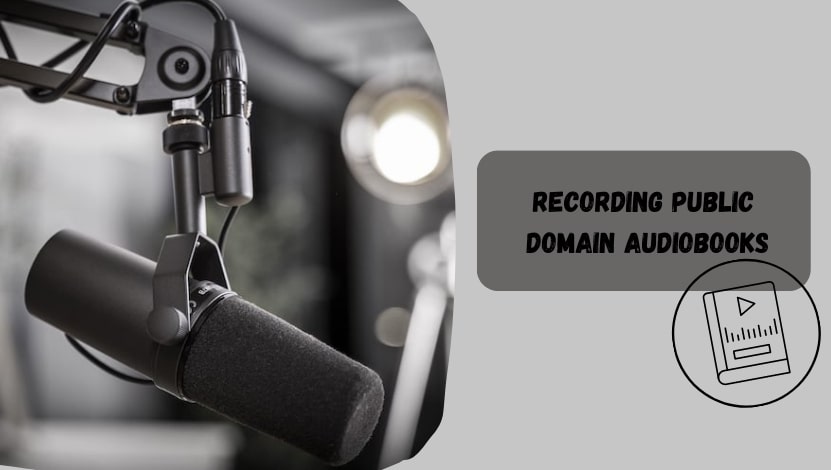This post presents a fun and free way for authors and narrators to practice their new narration skills. It is also for more experienced narrators who may be interested in donating their talents to people who may have learning disabilities or who may not have access to audiobooks.
I love the combination of reading stories while listening to the related audiobook. This was a major turning point for my daughter, who used to struggle with reading until she was able to combine listening and reading.
Something about the experience solidified her reading comprehension, which improved in all of her other subjects.
Why should you consider recording public domain audiobooks?
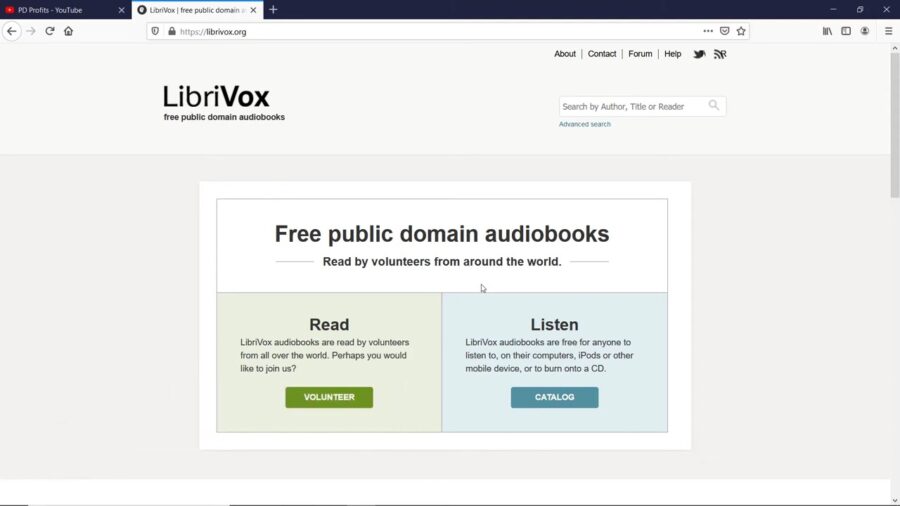
If you are an author who also wants to narrate your own audiobooks, this is the perfect way to get lots of practice. It’s even better if you decide to donate your recording back to the public domain, and help others hear audiobooks they may never have been exposed to.
In addition, if you really love an old tale like Hans Christian Andersen’s “The Mermaid,” you may want to use the public domain version to create a new novel.
These novels are called retellings because they always have a new way of looking at the same story. For example, you could retell the story from the point of view of one of the little mermaid’s sisters.
If you are a talented narrator, then you may want to record public domain books and donate the audiobook to LibriVox, who will make them available to anyone for free. In this case, you would be providing a quality recording to those who don’t have access to the audiobook for free.
There are definitely more reasons to create public domain audiobooks, but these are just a few that I thought of immediately.
What is copyright and public domain?
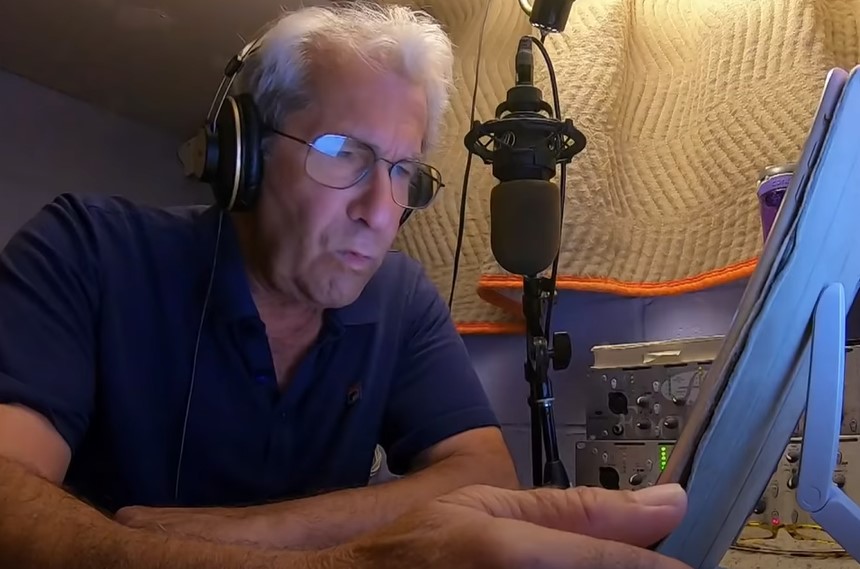
Copyright allows individuals or companies exclusive rights to text for a limited time period. This means no one else can reproduce that copyrighted text or make derivative works like audiobooks. Eventually, the copyright expires which means the text passes in to the public domain. Thus anyone can use the text any way they’d like to.
The tricky thing about public domain is sometimes a new story is released that is more popular than the original work, which is in the public domain.
For example, if you want to make a new story, it must be based on the original text by H.C. Andersen’s “The Mermaid,” which is in the public domain. Don’t use the Disney version “The Little Mermaid,” which is definitely copyright protected.
If you want to create a new book based on an old story, make sure you start with the version in the public domain. Once you create your new book, you are free to narrate the audiobook yourself or pay for professional narration.
What books are in the public domain?
All books published before 1923 are in the public domain. Some books produced between 1923 and 1978 may or may not be in the public domain due to a change in the copyright laws that required authors to update their public domain works.
All works released from 1978 will go into the public domain 70 years after the death of the author. In the case of corporations or works for hire, the text goes into the public domain 95 years from publication or 120 years from the date of creation. The date that expires first is considered the official date to enter the public domain.
Project Gutenberg is a library created by Google to place all public domain works in an easy-to-access website. The good thing about this site is Google has taken the time to ensure that the works under Project Gutenberg really are in the public domain.
If you are an author interested in one of the Disney movies, this is the place to find the public domain version, and create your own story that you can later narrate.
Is it legal to make an Audiobook?

If you make an audiobook from a book in the public domain, you are following the law. If the book is not in the public domain, then you are infringing on someone’s copyright, and you can expect legal action.
A few years ago, it was popular to read children’s stories on YouTube. It was innocent enough, but these books were not in the public domain. Over time, YouTube contacted all of these channels and asked them to remove the copyrighted works.
However, you can still read children’s books if you choose public domain books. Something important to keep in mind is that these books are old, and they may contain ideas that are not palatable to today’s society. Make sure you read through them first to make sure they won’t offend anyone.
Can I record public domain books in my own voice and publish it on iTunes/Audible?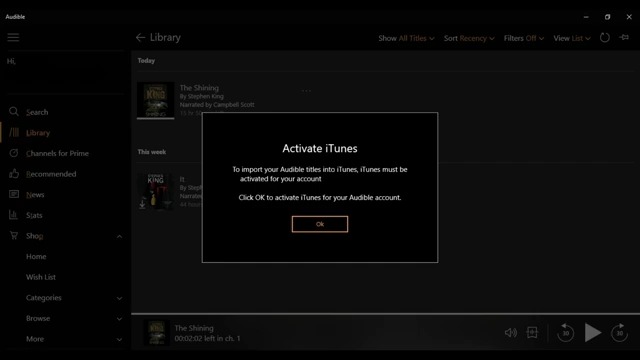
Audible and Audiobook Creation Exchange (ACX) are both Amazon companies that help authors and narrators record and sell audiobooks. Audible/ACX also distributes to iTunes, and any rules that apply to uploading audiobooks to ACX will affect Audible and iTunes.
Amazon does not want you to load text from the public domain. The reason is their customers could obtain that text for free and become annoyed when they realize they paid for something unnecessarily. To get around this, ACX has a few rules:
- Make sure the story really is in the public domain.
- Add your own original content to the text (i.e. introduction, annotations, study guides, illustrations, literary critiques, historical context, etc.)
- You must first create the book on Amazon. ACX allows you to select your own book from Amazon so that the metadata (i.e. title, author name, copyright, etc.) is automatically transferred from Amazon to ACX.
- You must hire a narrator outside of ACX or narrate the book yourself.
I came across a wonderful story How I Started My Audiobook Publishing Company by Karen Commins, who went through this process. She first created a book from a public domain story and then narrated her version of the audiobook. The journey was arduous only because she didn’t know the rules listed above. At each stage she had to redo some work in order to meet Amazon’s and ACX’s standards. In the end, she created a beautiful new audiobook.
Can I use a public domain book for an audiobook on YouTube?
You can create a YouTube video about your public domain book because it’s not copyrighted. However, you’ll run into the same problem as releasing a book on Amazon and consequently and audiobook on ACX. You should add something new to the work that is uniquely yours.
Consider adding new images, some information about the historical context, your own introduction, a study guide, or something else personal.
What is LibriVox?
LibriVox is a library of audiobooks that are in the public domain. In other words, it’s the audiobook version of Project Gutenberg. LibriVox is run by an army of volunteers who take the time to read a public domain book, create the recording, and donate the audiobook. The requirements to submit a recording are much more relaxed than ACX. However, sometimes a professional reader will volunteer their services and provide a high-quality recording for free.
There are no rules on who can narrate. Each narrator is free to choose any public domain book and create an audiobook. The result is sometimes they have more than one reading of the same book.
If you are interested in recording an audiobook, you really only need a microphone, computer, and recording software. The processes will be like reading a book to yourself out loud. You are required to edit your own recordings, but the mastering requirements are very relaxed. There are no reviews on the LibriVox website, as this would discourage volunteers.
If you would like to learn more editing your recorded narration, take a look at my article 19 Audiobook Editing Tips.
Is it legal to sell annotated or audio versions of published works in the public domain?
Yes, it’s legal to sell public domain works. You can add annotation, create an audio version, change the text, or anything you’d like. This is actually the best thing you could do with a public domain book. You should make changes so that you are adding something valuable to your listener.
I enjoy retellings of the same story that come from a different point of view. It’s a story that adds additional insight or an idea that never occurred to me. There’s so much fun you could have with these types of audiobooks.
How to make your voice sound better when recording without spending more money
Below are tips to make your voice sound good without breaking the bank.
1. Stay hydrated

This is one of the most important tips that seems obvious until you forget to sip water during your breaks. While you are speaking you’re expelling a lot of moisture from your mouth. This will dry you out and make your voice sound harsh. It’s easy to fix though. Take lots of breaks and sip water.
If you would like to learn more about preparing your voice for narration, take a look at my article How Do You Prepare Your Voice Before Recording Your Audiobook?
2. Speak clearly
Narration is not a normal conversation – instead, it’s a performance. It’s important to speak clearly and not slur your words together. Be sure to speak slowly enough that the listener can easily follow along.
The most common mistake of first-time narrators is speaking too quickly. One way to combat this is to record yourself reading a passage and listen to it critically or have someone else listen to it. You are checking for words clearly spoken and at an even, understandable pace.
3. Take lots of breaks
Narrating an audiobook is hard work. If you have never done this before, stop frequently and rest. Narrate in shorter 15 – 30 minutes sessions. If you are standing, you will need to give your body a break as well as rest your vocal chords.
4. Annotate your script
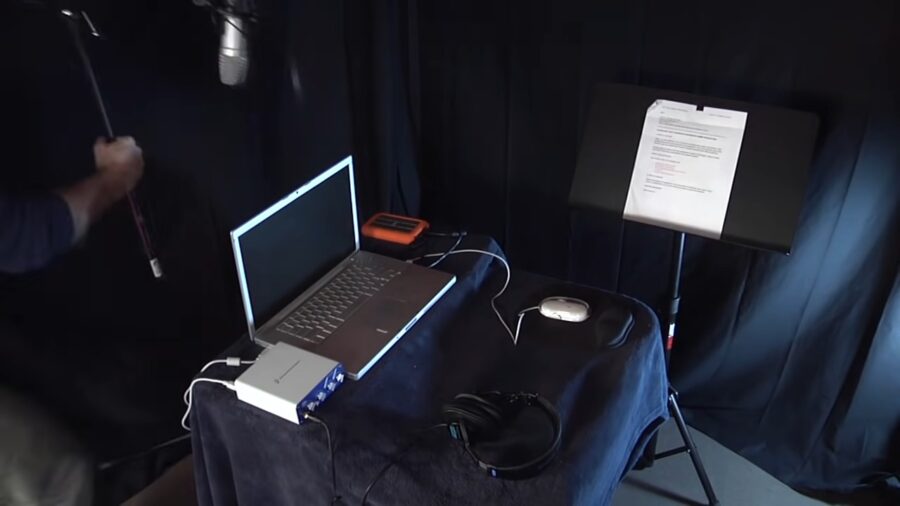
Annotations in your audiobook script serve as directions while you perform. These instructions could let you know where to emphasize words or just clue you into who is speaking.
If you would like to learn more about annotating audiobook scripts, take a look at my article How Do You Write an Audiobook Script?
5. Stand up while recording
Standing creates more space for your diaphragm and makes your voice sound better. It’s hard to stand for long periods of time, so take precautions. Don’t record while you are tired.
6. Put the microphone in the right place
The standard recommendation for microphones is to place them 8-10 inches from your face. However, this depends on your voice, the microphone, and your recording area. The best thing to do is experiment with different types of microphones at varying distances from your mouth.
Record a sample of audio onto your computer and see which one you like best. Listen to each of these test records and choose the mic and placement that sounds the best.
If you would like to learn more about microphone placement, take a look at my article How Far Should My Microphone Be From My face.
7. Use a pop filter
These filters are $10 – $20 on Amazon and can save your listener from an irritating performance. These filters stop the popping sounds that originate from pronouncing words with hard constants like “P” and “B.”
8. Treat your recording space
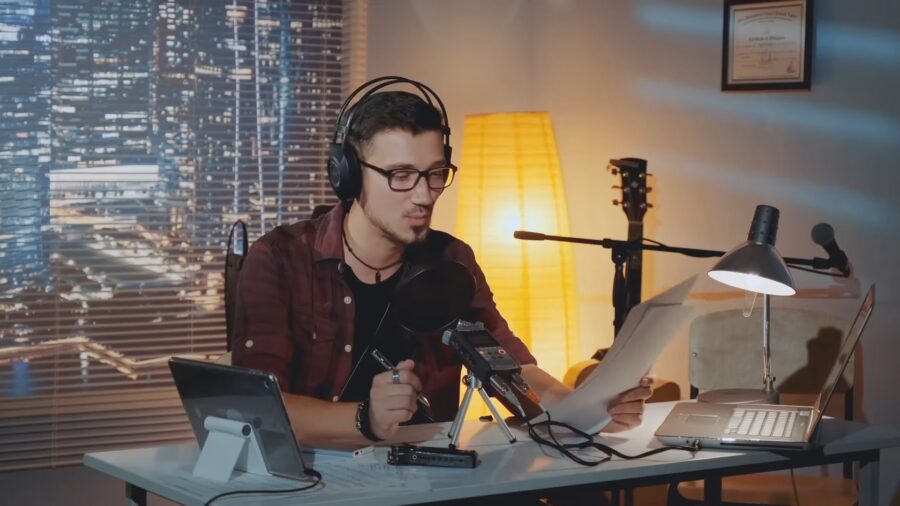
When you treat a recording space, you add soft material to the walls, floor, and (if possible) ceiling. The most inexpensive way to do this is to record in a walk-in closet. Other options may be to tack a blanket on a wall and record next to that wall.
If you would like to learn more about home studio options, take a look at my article Audiobook Recording Home Studio Tips.
Conclusion
Public domain books and audiobooks are a great way for new authors and narrators to get practice with the craft of narrating without spending a large amount of money.
These stories could be enhanced by adding unique information to the book and, thus, the audiobook. One the other hand, a straight reading of the original text that you donate to LibriVox is an excellent way to practice as well.
Have you created an audiobook based on a public domain story? Which story did you narrate? Let me know in the comments below.
Disclaimer: I am not an attorney, and the information in this article should not be considered legal advice. You should seek appropriate counsel for your own situation. In addition, this post is directed toward readers in the United States. If you are conducting business outside of the United States, seek professional legal advice for your specific area.

